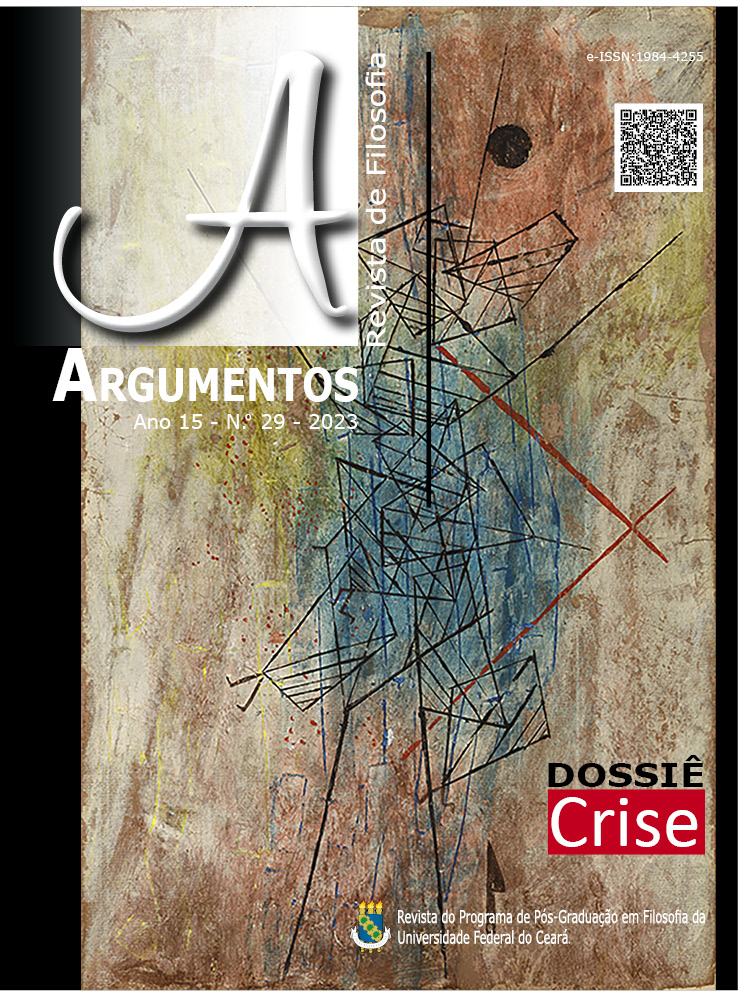“Pensamento dialético” na “Teoria dos Cinco Elementos” na China antiga
DOI:
https://doi.org/10.36517/Argumentos.29.21Keywords:
Teoria. Cinco elementos. Dialética. Conduta. Mutualidade.Abstract
A Teoria dos Cinco Elementos é uma das primeiras teorias na história da filosofia chinesa. O nascimento da doutrina marcou uma virada no processo de percepção do mundo com os cinco elementos básicos de metal, madeira e água, fogo e terra. Esses cinco fatores são percebidos na forma de experiência, o nível de consciência ainda é rudimentar e as características mais gerais da matéria ainda não foram generalizadas. No entanto, com as duas leis dos Cinco Elementos do nascimento mútuo, os cinco elementos opostos se complementam ao explicar a formação, desenvolvimento e transformação do mundo material. São duas leis que se aplicam para explicar as leis da natureza, da sociedade e do corpo humano. A Teoria dos Cinco Elementos mostra que coisas e fenômenos no universo e na sociedade não ficam parados, mas estão sempre em movimento, mudando e girando constantemente. Neste artigo, nos concentraremos em esclarecer o pensamento dialético da teoria dos Cinco Elementos na natureza, na sociedade e no corpo humano. O artigo abrirá uma nova abordagem para a teoria dos Cinco Elementos e a próxima direção de pesquisa é a aplicação da teoria na medicina oriental.
References
ABEND, G. Styles of Sociological Thought: Sociologies, Epistemologies, and the Mexican and U.S. Quests for Truth. Sociological Theory, v. 24, n. 1, 2006, p. 1-41.
CHANG-BEOHM, A.; KYUNG-JUN, J.; HYUN-MIN, Y.; CHEOL-HONG, K.; YOUNG-KWANG, M.; CHUN-HO, S.; JANG-CHEON, L. A Study of the Sa-Ahm Five Element Acupuncture Theory. Journal of Acupunct and Meridian Studies. v. 2, n. 4, 2009, p. 309−320.
CHUNGUANG, R.; XIAOMING, Y. Research on Costume Ideology of the Pre-Qin Period from Perspective of Chu Ci. Asian Social Science, v. 16, n. 4, 2020, p. 59-64.
CONFUCIUS. The Book of Changes. Hanoi: Literature Publishing House, 2007.
CONFUCIUS. The Book of Historical Records. Hanoi: Information Culture Publishing House, 2004.
CUNG, K. T. Philosophical Dictionary. Hanoi: Information Culture Publishing House, 2002.
DU LUN. The Early Zhou Period: Origin of the Idea of Political Legitimacy and the Political Philosophy of Confucianism, “Open Journal Systems, Asian Studies, 5(1), 67–80, 2017.
FUCHS, C. The Dialectic of the Nature-Society-System. Triple C Open Access. v. 4, n. 1, 2006, p. 1-39.
GABRIEL, A. The Meaning of “Theory”. Sociological Theory, v. 26, n. 2, jun./2008.
HEMPEL, C. G. Aspects of Scientific Explanation and Other Essays in the Philosophy of Science. New York: Free Press, 1965.
HUB, Z. Dialectics of Nature as a Vibrant Research Program: Commemorating Friedrich Engels (1820-2020). Journal of Dialectics of Nature, v. 42, n. 12 (Serial n. 268), dec./2020.
JANG, D-S. Constitution classification by the interpretation of physical properties of Yin & Yang and Five Element Theory. Journal of the Korean Mental Science Society, Korean, v. 2, n. 1, 1998, p. 92-99.
JIFA, G.; YIJUN, L.; WUQI, S.; ZHENGYANG, Z. Systems Science and Traditional Chinese Medicine, JAIST Repository, 2007.
LIU, Z. The King’s Power Dominating Society — A Re-examination of Ancient Chinese Society. Journal of Chinese Humanities, 2015, p. 4-24.
SUN, K. C.; SEONGWON, C.; SEO, Y. L. J.; HYUN, P. S. L. The Five Elements of the cell. Integrative Medicine Research Open Access, v. 6, n. 4, 2017, p. 452-456.
TASHA, R. W.; GILLILAND, S. Considering the Yin and Yang of Teaching and Learning: A Resource for the Novice Educator. Medical Science Educator, v. 29, n. 1, 2019, p. 299–306.
USEEM, B. Solidarity Model, Breakdown Model, and the Boston Anti-Busing Movement. American Sociological Review, v. 45, n. 3, 1980, p. 357-369.
VIETNAM Encyclopedia. Hanoi: The Truth Publishing House, 2003.
XINYAN XINYAN. Chinese Dialectical Thinking — the Yin Yang Model. Philosophy Compass, v. 8, n. 5, 2013.
YITZCHAK, J. Recent research on the Western Zhou period: Introduction to the 2019 essays. Archaeological Research in Asia, v. 23, sept./2020.
YUAN, C. Legitimation Discourse and The Theory of the Five Elements in Imperial China. Journal of Song-Yuan Studies, v. 44, 2014, p. 325-364.
ZIMI, M.; CHUNHUA, J.; JIN, G.; HAORONG, G.; YANHUAN, M. Features analysis of five-element theory and its basal effects on construction of visceral manifestation theory. Journal of Traditional Chinese Medicine, v. 34, n. 1, 2014.
Downloads
Published
Issue
Section
License
Argumentos magazine is licensed under an International Creative Commons Attribution License.
The Magazine uses CC BY inclusion
1) The authors retain the copyright granted to the magazine or the right to initial publication, with the work regularly licensed under the Creative Commons Attribution, which allows the sharing of the work with acknowledgment of authorship and initial publication in this magazine.
2) The authors are authorized to contract additional applicable contracts, for non-exclusive distribution of the version of the work published in this journal (for example, publication in the institutional repository or as a chapter of the book), recognition of authorship and initial publication in this journal.
3) Authors are authorized and encourage to publish and distribute their work online (for example, in institutional repositories or on their personal pages) at any time before or during the editorial process, as they can generate productive changes, as well as increase the impact and reference of published work.




.jpg)










._._3.png)
1.jpg)
._._._.png)
